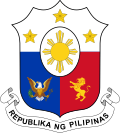 | |
 | |
| Agency overview | |
|---|---|
| Formed | May 8, 1899 |
| Preceding agencies |
|
| Type | Constitutional Commission |
| Jurisdiction | National |
| Headquarters | Diliman, Quezon City |
| Employees | 8,065 (2024) [1] |
| Annual budget | ₱12.46 billion (2020) [2] |
| Agency executive |
|
| Website | www |
 |
|---|
The Commission on Audit (COA; Filipino : Komisyon sa Awdit [3] ) is an independent constitutional commission established by the Constitution of the Philippines. It has the primary function to examine, audit and settle all accounts and expenditures of the funds and properties of the Philippine government. [4]
Contents
- Members
- Description
- Current composition
- Former auditors general
- Membership history since 1987
- Powers
- See also
- References
- External links
The Commission on Audit is a creation of the 1973 constitution. It was preceded by the Office of the Auditor in 1899, renamed as the Bureau of the Insular Auditor in 1900, then to the Bureau of Audits in 1905. The 1935 constitution created the General Auditing Office (GAO), and was led by the Auditor General. The 1973 constitution renamed the GAO to the Commission on Audit, a collegial body led by a chairman, with two commissioners. That setup was retained by the 1987 constitution.
The other two Constitutional Commissions are the Commission on Elections and Civil Service Commission.







